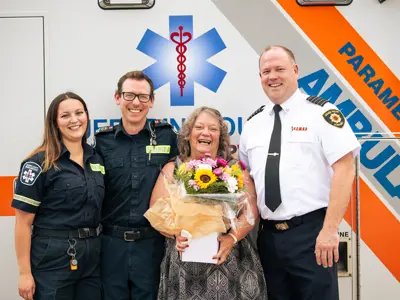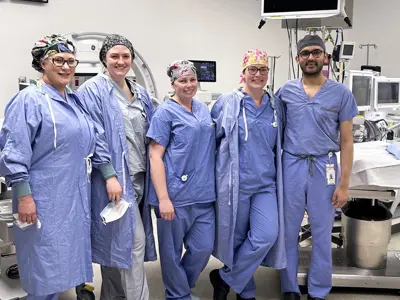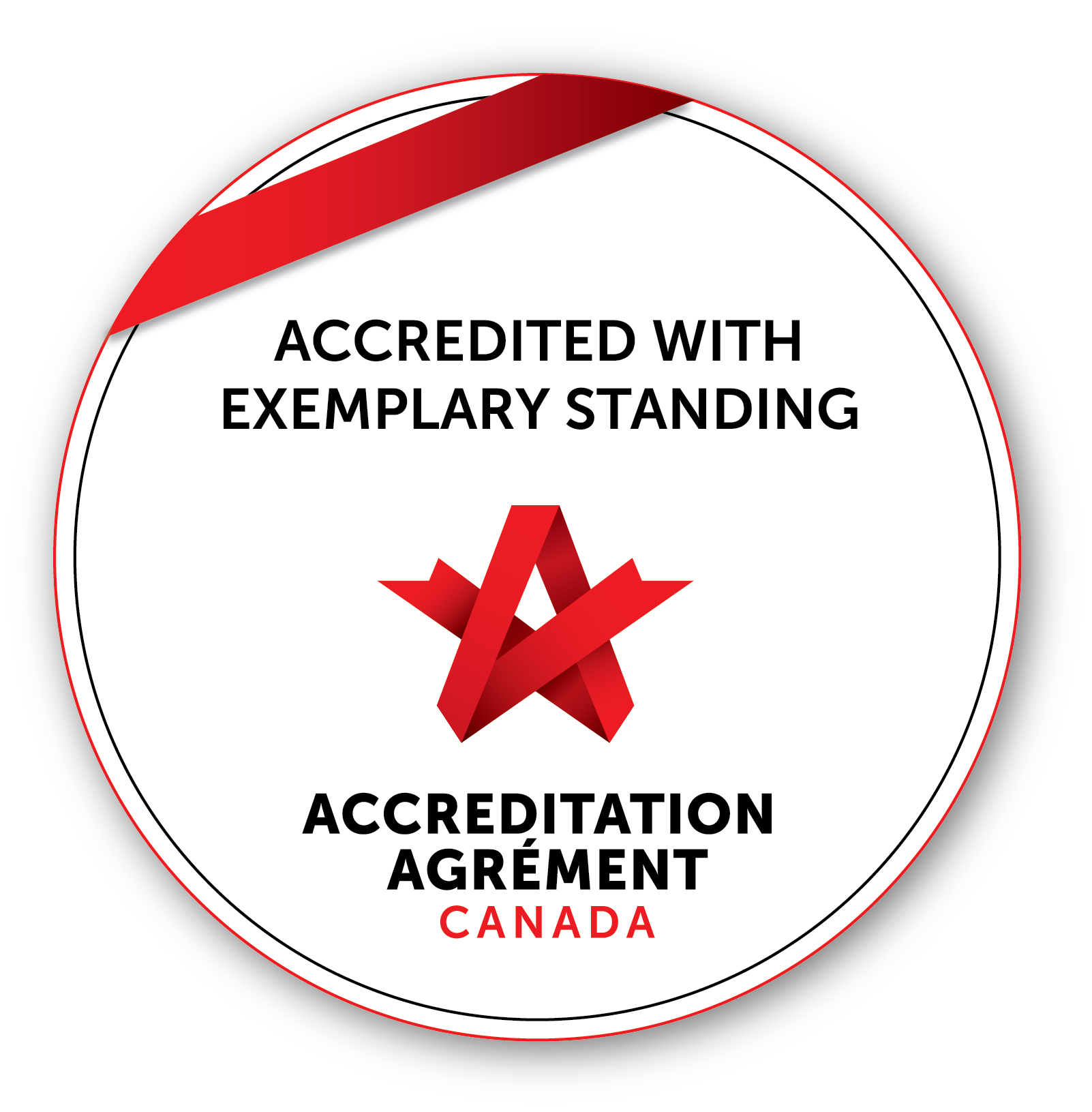Your Stories
Our patients, families, caregivers, staff and volunteers - are what makes HHCC great! We love hearing about your connection with HHCC.
Access our media policy.

Sherry faced a life-threatening heart attack and was resuscitated by a heroic team of paramedics and a firefighter.
I Died Three Times and Survived
“I know I’m lucky and I can’t be more grateful.”
Sherry, a resident of Grand Valley, would never have imagined she would one day be able to say something not many people can; she has died three times and survived.
Her harrowing ordeal began in the evening of Sunday April 14, 2024. After a long full day away from home, all Sherry wanted was to relax at home with a little TV time. Unfortunately, this was not going to happen.
As the evening progressed, she experienced relentless heartburn. She couldn’t understand why.
Sherry was finding it harder to move on her own, and she required support from her husband to stand and walk. Her body was weakening. After her husband helped her to the ground to prevent any falls, he called 9-1-1.
Critical-life saving minutes
Dufferin County paramedics Georgia Reidl and Evan Daemke responded to the call in a minute and a half. They found Sherry with extremely low blood pressure. Sherry asked them if she was experiencing a heart attack. “Yes, I think so,” one of them told her as they were taking her vitals and helping her swallow an aspirin.
Then, things moved quickly.
Firefighter Jeff Beatty arrived as part of the emergency response, and the trio transported Sherry outside to the waiting ambulance.
Jeff began chest compressions as Evan used the defibrillator seven times to repeatedly bring Sherry back.
Sherry lost her vitals three times, as they raced to get her to Southlake Regional Health Centre, home of the regional cardiac program. Patients are transferred for specialised care by partners, including those in Dufferin County.
When Sherry awoke in the hospital, she panicked and was in excruciating pain and with no memory of what had happened after leaving her street. Her husband was able to share some of those details.
The nurses and doctors at Southlake provided exceptional care. They told Sherry how lucky she was to have survived. She was discharged three days after being admitted to hospital.
Liz Lalingo, Southlake’s Director of Cardiac Health credits the hard working and dedicated emergency response teams and Headwaters Health Care Centre to ensuring Sherry received the life-saving care she needed before being transferred to Southlake. “We truly appreciate their continued partnership.”
Filling in the blanks
Sherry remembers nothing except being in the ambulance with the paramedics and firefighter, answering all their questions and recalling the evening’s events that led to the 9-1-1 call.
As she recovered, Sherry was eager to “fill in the blanks” of her near-death experience. She had heard how lucky she was to be alive and was so grateful for everyone involved in saving her life. There were still missing pieces between leaving home and waking in the hospital. Sherry needed to understand what happened.
Meeting her paramedics
She connected with Gary Staples, Chief of Dufferin County Paramedics to see if he could help. In no time, she met paramedics Georgia and Evan and spoke with firefighter Jeff Beatty. It was an emotional reunion.
Sherry had a critical life-threatening event and was resuscitated. It was a challenging and dynamic call but ultimately very rewarding. The likelihood of surviving an out of hospital cardiac arrest is extremely low - higher when witnessed by or in the care of EMS but still remarkably low. Making this a relatively rare event.
In emergency medical services (EMS), you are often meeting people on the worst day of their lives. Typically, we are called to negative situations which all too often have tragic endings. Due to the nature of our country's understandably strong health privacy laws we rarely even get to know the outcome of our patients and rarer still reconnect with them. - Evan Daemke
I got a little emotional getting to talk to her and hear about her life after her medical event. She got to continue on thanks to my partners quick thinking and lifesaving interventions. It was one of the most critical calls I've gotten to be a part of yet. I've never been prouder to work with someone. I've never been more proud and happy getting to work for the service I do. - Georgia Reidel
Regional Cardiac Program’s Role
As the home of the regional cardiac program, Southlake works together with health system partners to provide leading edge cardiac care to patients across the region, including those who live in Dufferin County.
Advice to other women
After her experience, Sherry has become an advocate for preventative heart health among women. Heart attacks can present differently in woman compared to men; they don’t always get the same symptoms. Sherry’s advice to all women is to listen to their bodies, it will tell you when something is wrong.
“I had persistent heartburn and a little nausea all that week leading up to my heart attack. I kept ignoring it and really shouldn’t have,” she said. “I would say to other women, don’t be afraid to call your doctor or 911 for help. It is better to get timely help, for you and your family’s sake.”
Recovery includes at-home support
Now on the road to recovery, Sherry is back working modified duties taking it one day at a time. She is in therapy for her PTSD and suffers from panic attacks. She is working hard with the encouragement of her friends and family.
“The fact that Sherry is back to living her life, to be able to love and cherish her family after it was all so very nearly taken away forever is extraordinary," said Evan.
Sherry is now a patient of the Dufferin County Community Paramedicine Program, a community-based health care service that helps people live safely and independently at home. Programs like Community Paramedicine help ensure individuals receive follow-up support and care in their recovery at home, which can prevent other emergencies from happening.

Headwaters Health Care Centre is offering treatment closer to home for men with prostate cancer.
Prostate cancer surgery close to home
Headwaters Health Care Centre is offering treatment closer to home for men in the Dufferin-Caledon community. Dr. Shreyas Gandhi, a urologist and Vice President of General Medical Staff at Headwaters Health Care Centre brought this life-saving prostate cancer surgery to the community and his team.
“Radical proctectomy involves removing the entire prostate gland in the treatment setting of cancer. We started offering this procedure in November 2023 and all our patients have done really well. We’ve performed four surgeries since then and the surgical outcomes and perioperative recovery care has been very strong,” says Dr. Gandhi. Previously, over the past five years, there were approximately 250 radical proctectomies referred to other centres. “Our plan is to start performing 30 or 40 per cent of those procedures at Headwaters, and that’s a significant number of patients who can receive treatment and recover closer to home,” says Dr. Gandhi.
Radical proctectomies are surgeries that require many different steps before and after the surgery, and several follow-up visits. Our physician performs the initial consultation, and the patients are referred out for biopsy. Once the need for radical proctectomy is determined, patients can come to Headwaters for CT imaging, bone scans, radiology, preoperative care, such as blood work, counselling, anesthesiology for pain management, the surgery procedure, recovery at the hospital, and once discharged, Headwaters facilitates home care and follow-up pathology visits.
“It’s very exciting that we’re providing prostate cancer surgeries in our community. I find that my patients always prefer to stay close to home, not only for their surgery but the care around the time of surgery.”
Dr. Gandhi also trained Headwaters’ allied health team, operating room (OR) and post anesthetic care unit (PACU) nurses to have the skills to look after patients after their surgery in the recovery room and on the hospital floors. Family physicians in the region were also informed of Headwaters’ new surgery offering, so that they could refer patients locally to Headwaters for surgery.
Thanks to the generous donations from our community, Headwaters was also able to acquire specialized equipment for radical proctectomies. We are deeply grateful for the equipment funding by the Grand Valley Lions Club, Orangeville Lions Club, Shelburne Lions Club, and International Lions Club Foundation.
"It's an exciting time for patients who can have access to prostate cancer care in our community. It's also exciting that physicians and surgeons in the area can be part of this innovative care. None of this would be possible without the entire hospital and community getting involved. Expanding our surgical program in a growing community is always a priority so we can provide the best evidence-based care to our patients,” adds Dr. Gandhi.
Contact Us
519-941-2410
info@headwatershealth.ca
100 Rolling Hills Drive
Orangeville, ON
L9W 4X9

 We are dedicated to safe, high-quality care, Headwaters is proudly accredited with Exemplary Standing.
We are dedicated to safe, high-quality care, Headwaters is proudly accredited with Exemplary Standing.